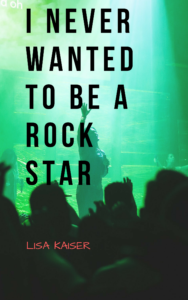I Never Wanted To Be a Rock Star (Four Furies Trilogy Book 1)
Readers’ Questions for Lisa Kaiser
Q: Why do you say that Maggie is shy? She seems very extroverted at times and was able to perform in public for many years. To me, she didn’t act the way I think shy people normally act.
Lisa: That’s a great question.
I was inspired to write about a shy rock star because I wanted to show that shy people can do anything they set out to do—even if their chosen career path doesn’t seem to be an obvious one for a shy person. I wanted to show that shy people can be rock stars, if that’s what they want.
Feelings of shyness shouldn’t prevent people from pursuing their dreams. Shy people become nervous and highly self-conscious when they’re in unfamiliar social situations. They sweat, get knock-kneed, stammer, clam up, and look uncomfortable (because they are uncomfortable). In the book, Maggie shows these traits when she has dinner at the Karma Community for the first time, and she often breaks out in sweat and rashes when she’s under pressure. When you think about it, her stage fright is an intense form of the shyness she feels in her daily life. But she dealt with it.
Another thing to note is that shy people want to be with other people. But they feel ambivalent about their ability to connect with another person successfully. So Maggie’s waffling on a singing career and her conflicting feelings about fame are yet another expression of her shyness.
Lastly, most if not all shy people can pinpoint the event that “created” their shyness. Sometimes it’s being called on in class and not having the right answer, or feeling isolated after starting a new school and being the new kid, or being rejected by a potential romantic partner. For Maggie, it’s being humiliated by her classmate during her big Christmas concert solo. Of course, that sets into motion her desire for revenge. Her fury.
Q: Maggie considers herself to be a feminist. But her two careers have been in partnership with stronger, older men. So, is she a feminist?
Lisa: I’m glad you asked that question. Yes, Maggie’s a feminist because she says she is one. And like most if not all feminists she isn’t a totally independent, self-made woman. She has worked in partnership with others; in her case, she’s worked with powerful men. Her shyness and self-doubt made it difficult for her to assert herself and go solo, even though she has the smarts and talent to do so.
This part of Maggie’s story drew heavily from other female rock stars of her generation. When you think about it, a lot of them were in bands or collaborated with their partners – Stevie Nicks, Christine McVie, Carly Simon, Linda Thompson, Grace Slick, Pat Benatar. I think that’s due to the fact that rock bands were a relatively new phenomenon back in the 70s and 80s, and they were wild, male-dominated, and hedonistic. Perhaps the female singers of that time worked with their partners for protection, or to create a more civilized atmosphere. I’d love to talk to them about it.
Q: Am I supposed to like Aaron? He was terrible to Maggie when they were in the band but he seems to have gotten it together after they broke up.
Lisa: Ah, Aaron. I’ve gotten a range of reactions to Aaron from members of my writers’ group. Some hated him with a passion while others thought he had redeemed himself. I knew that their conflicting opinions meant that Aaron had become a three-dimensional character in their minds–a good thing. I have a lot of affection for Aaron–I have a lot of affection for all of the characters in this story–so I can’t be objective about whether he’s good or bad. He’s a complicated guy in a complicated relationship with Maggie, Sage, Sybylla, and everyone else at the Karma Community.
Q: Sage’s journey throughout the book intrigued me. He started out in search of his father and found him. Did he get what he wanted?
Lisa: I think he did get what he wanted. At least I hope he did. He got to know Aaron as a person instead of idolizing or demonizing him from a distance. He doesn’t have to rely on Maggie’s negative opinion or him, or the legend that surrounded Aaron as a guitar god. Sage’s new knowledge of his father may not be totally positive, but at least it’s based on Sage’s own judgment and experience, not fantasy or hearsay.
Q: Why did you set the story in southwestern Wisconsin?
Lisa: Quite simply, I love this part of Wisconsin. It’s absolutely gorgeous–even more beautiful than the stereotypical picture postcard–and it still feels pretty far removed from the cares of the city. I’m also intrigued by the mix of cultures in this area. It’s home to generations of Native Americans, plus Scandinavians, hippies, outdoors enthusiasts, cheese makers, beer makers, wine makers, hunters, Amish, and rock-ribbed conservatives. The Karma Community seemed like it would be an anomaly in the area but fit in perfectly as well.
Plus, I wanted the characters to interact with each other and not rely on texting or phone calls. That means they’d wouldn’t be able to get cell phone reception. I know my phone certainly cuts out once I’m in the Kickapoo Valley, a tech failure that I wholeheartedly welcome.
Do you have a question for Lisa? Contact her here.
